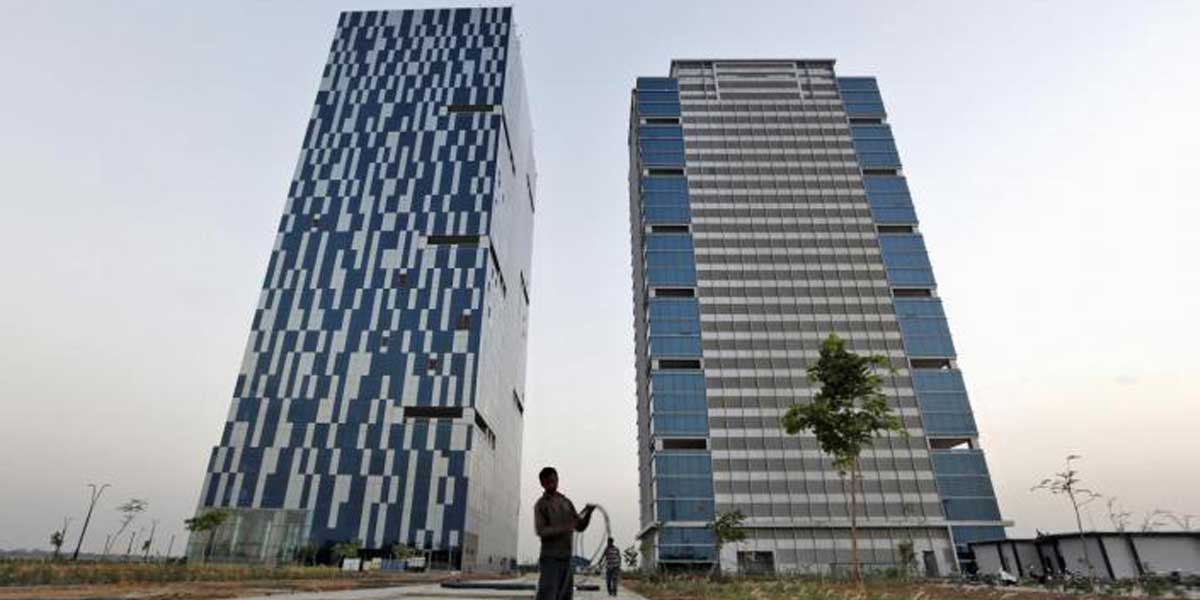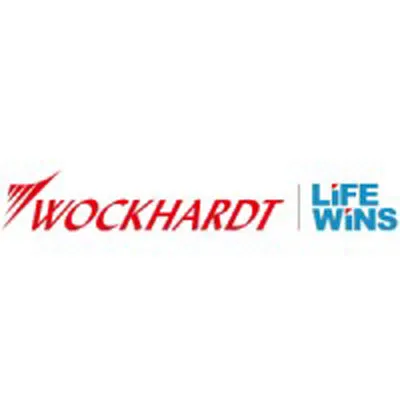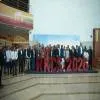With an intent to modernise the urban environments in our country and bring them up to world-class standards, the Government of India recently embarked upon a transformational mission to develop 100 smart cities in the country under the Smart Cities Mission (SCM). The Ministry of Housing and Urban Affairs (MoHUA) is the nodal ministry coordinating between the Central Government, state governments, local city authorities and funding institutions. Though considerable efforts are being put into this initiative, press reports suggest that hundreds of projects under SCM are still incomplete and problems have arisen mainly owing to lack of coordination among multiple government departments. In this article, we will examine how the adoption of Lean concepts can solve this problem.
Makeup of typical smart city development
The typical works forming part of the development of smart cities include infrastructure development (housing, water supply, sanitation, electricity supply, health, education, mobility, safety and security, IT connectivity and digitalisation), covering a multiplicity of services across several disciplines and locations. Some part of this work involves ‘soft’ work but a major part involves ‘hard’ work, such as construction. All the development needs to be within the limitations of the urban space available, within a short time to minimise disruptions to normal life and within specific budgetary constraints as total funds available are limited.
The programme essentially has six fundamental concepts as proposed by MoHUA (https://Smartcities.gov.in/about-the-mission), covering the following: community at the core; more from less; corporative and competitive federalism; integration, innovation and sustainability; technology as a means, not the goal; and convergence (see Figure 1).
Analysing the implications of these concepts, one would notice that these are collaborative working, waste avoidance, respect for others, continuous improvement/innovation, development of achievement culture and multiple disciplines converging to realising value. These factors are nothing but the very cornerstones of Lean concepts and Lean construction management (LCM)! Well-known in the manufacturing, construction and IT sectors, Lean implies getting more from less following the concepts mentioned above.
How to make implementation smarter?
Implementation mainly involves three phases: planning/design, construction and operations. Of these, planning involves many agencies operating collaboratively in real or virtual spaces. Construction manifests the physical features of smart cities, intertwining a multiplicity of systems and elements. Operation occurs in real time using the results of the first two phases –services that all need to be operated continuously, collaboratively involving many service provider agencies and without interfering with other services. All these call for a high degree of control, monitoring, collaboration and continuous improvement. Of the above, construction is the one that would take the maximum time and involve the expenditure of maximum funds and, hence, deserves our full attention.
Construction, particularly under Indian conditions, is fraught with many problems and uncertainties, which are well known. There are too many wastes in the system covering materials, man-hours of staff and labour, rework, etc. Planning systems, wherever present, are not that robust. Adoption of high-end technology and automation is low, along with low consciousness of quality and safety. The Ministry of Statistics and Programme Implementation (MoSPI) reports that over 40% of projects have high time and cost overruns. All these would indicate that traditional project management systems are not very effective in construction.
Lean construction – the potential gamechanger
Lean principles originated in manufacturing to improve operations efficiency. They have been very successful in manufacturing and got migrated to construction around 1990, and are poised to stir up the IT arena in the near future! Lean is a way of creating more value with less investments, efforts, time and space, by removing waste from the work that generates that value, with continuous improvement by collaborative working and a holistic approach (see Figure 2). Lean is essentially a concept and a culture – a way of doing things – rather than an assemblage of tools and practices.
Lean construction looks upon projects as production systems with high certainty levels based on an integral approach covering overall flow of work with the concept of ‘pull’ rather than ‘push’. A comparison between the Lean construction approach versus the traditional approach is given in Figure 3.
Lean construction came to India when the Institute for Lean Construction Excellence (ILCE) was established in 2008 as a not-for-profit body with illustrious charter members such as Larsen & Toubro, Shapoorji Pallonji, Afcons, Infra, Godrej Constructions, Tata Realty and Infrastructure Ltd, URC Construction and ARCOP Architects, with IIT-Madras as knowledge partner. ILCE has organised several seminars, workshops and conferences – the Indian Lean Construction Conferences (ILCC2015-, ILCC2017, ILCC2019, ILCC 2021) and International Conferences (IGLC2018, LIPS2019) –with good participation. Now, many project sites are using LCM concepts.
Application of Lean concepts in implementation of smart cites
In this section, we will see how Lean concepts can facilitate the various features of smart cities.
Planning and design
Initial planning covers several complex services and the time available is limited. The high degree of coordination, monitoring and control required are enabled by various Lean tools:
Big Room Meetings: When multiple stakeholders are involved, it is very efficient to get them all into the same space (Big Room) for expeditious exchange of all required information to conclude all planning and design efficiently and quickly. All viewpoints are duly considered, all stakeholders are kept in the picture without any lengthy communications and decisions are taken quickly without any red tape. It is important that all attendees are fully empowered to offer and accept information and operate in a collaborative manner with trust and transparency. Virtual Big Room meetings can be organised using online services
Building information modelling (BIM): This is an excellent tool to compile detailed information about multiple services on the same framework. Apart from all geometrical information, the same framework also holds parametric information on relevant stakeholders, timelines and costs. This tool would also be very useful to explain the designs and planning to the various stakeholders and workmen for expeditious implementation. Visual comparisons of different alternatives, comparison ‘as is’ and ‘as should be’, 4D visualisation of progress with schedules, 5D visualisation of cost build-up with progress, virtual reality, augmented reality and mixed reality are all possible.
First Run Studies: For first-time applications or complex/innovative applications, it would be better to undertake First Run Studies, i.e. do a mock-up or model study of the actual entity, study all the problems and issues involved, sort them out and then roll out the prototypes. The Lean concept of PDCA (Plan, Do, Check, Act) is of great use (see Figure 4).
Value Stream Mapping: Using this tool, one can map out the various work streams contributing value for the project, identify and analyse the various operations involved in terms of time and cost and streamline/optimise the operations and sequence to eliminate wastage and increase value. This well-tested value improvement process is very useful for complex projects involving multiple operations to eliminate ubiquitous wastes.
ConstructionCPS process: Lean construction has an excellent tool called the Collaborative Planning System (CPS). Instead of making ab-initio large critical path method networks that are quite inefficient in the overall sense, CPS looks at the construction schedule in a telescoping manner. It starts with a brief master schedule, phase schedules and then look ahead schedules, which are rolling plans covering a short window such as six to 12 weeks of work. The potential constraints that would come in the way of the implementation over this look-ahead window are reviewed every week and sorted out in advance. Hence, when the actual work comes up in the current week (after several reviews in the look-ahead period), work can go on very smoothly in the absence of any constraints. An index called PPC (Plan Percent Completed) is used for continuous broad-spectrum tracking and monitoring of weekly plans (see Figure 5). Continuous feedback loops ensure there is constant learning and elimination of problems continuously and consistently through a process called Root Cause Analysis. This improves predictability and certainty in construction operations to a considerable extent, with considerable savings in time and cost.
Lean construction has an excellent practice called 5S, which is a visual management-cum-housekeeping practice, keeping the site in a very orderly manner. 5S (see Figure 6) stands for: Sort out unwanted materials from the site; Set in order necessary materials; Shine or keep clean required materials, Standardise procedures; and Sustain practices on a continuous basis.
Supply Chain Management: Conventional project management paradigms have many buffers –for time, resources, fall-backs, etc – which are costly. The CPS process of Lean minimises uncertainties and improves predictability with less buffers. With various Lean management tools, such as CPS, BIM, Kanban, pull systems and 5S, one can schedule supplies with Just-In Time deliveries with least buffers and yet be sure that work will not be affected. Lean builds relationships with vendors to work collaboratively in an alliance manner to facilitate strong supply chains. Lean also facilitates continuous improvement and the use of new technologies, such as drone-based deliveries in large sites, CCTV systems and BIM.Contracting: Conventional contracting, particularly involving the public sector, is very involved and complex, based on distrust between the two parties and is largely ineffective and inefficient, as seen by the typical enormous time and cost overruns. Lean contracting is based on mutual trust and respect, with contract terms to be equitable and balanced. Target Value design (TVD), Integrated Project Delivery (IPD) and Alliance Contracting can be efficiently used to achieve the objectives more successfully, based on trust and equitable treatment.
Operations
Usually, smart city operations involve many agencies, workmen and operators and multiple theatres of operation. Productivity improvement tools are very useful to identify the wastes involved in processes and improve efficiency by cutting down on time and cost. Work sampling is a time-tested tool to analyse the various ongoing operations to scrutinise the actual activities involved as VA (value adding), NVA (non-value adding) and NVAN (non- value adding but necessary), and work towards eliminating NVA and NVAN to improve efficiency. Kaizen or continuous improvement is another excellent tool to incentivise the large number of people involved to come up with suggestions and implementations of continuous improvement in various operations.
Lean culture
It must be emphasised that changing over to the Lean process calls for change and the process has to be implemented very carefully in a planned manner for it to be fully effective. In the long run, all concerned should develop the Lean culture. It involves collaboration, is based on trust and respect for others and focuses on continuous improvement, all with a constant quest for value improvement and elimination of wastage.
There is a new movement called LIPS (Lean in the public sector). The aim is to get public-sector clients to use LCM in their projects and specify the same in contracts, as well as to practice Lean concepts in public-sector services, such as governance, transportation, health services and infrastructure development, to add value for the general public and avoid waste, i.e. deliver more with less. There have been many LIPS international conferences and this international movement is gathering momentum.
The way forward
The agencies planning and implementing smart cities should first realise the advantages of the Lean process and determine to change over to this process in all their activities. There are Lean coaches available to implement the Lean process, such as ILCE and IIT-Madras. One needs to initially identify the objectives to be achieved, stakeholders involved, overall processes to be adopted, timelines and budget constraints, and then develop the Lean process, roll it out and implement it progressively. There is an upcoming ILCC 2021 conference in CEPT, Ahmedabad, where more details can be obtained.
Lean is a great system that yields good results when practised properly –comprehensively or modularly. Lean is much more than a mere construction management concept; it is a transformational system. Lean management is a sure solution to the problems currently faced in the development of smart cities. Simply put, the motto should be: ‘Go Lean to get Smart!’
About the author: Prof N Raghavan, Professor of Practice, Department of Civil Engineering, IIT-Madras, has a career spanning design, construction, project management, academia and institution building. He is a member of the board of directors of the Institute for Lean Construction Excellence (ILCE). His passionate efforts have been a significant force for the Indian construction sector to see Lean conferences, industry-academia symbiosis and deployment of Lean implementation programmes in real projects. He is a member of several professional bodies and also an independent director in a few transportation-sector SPVs.Register for webinar




















